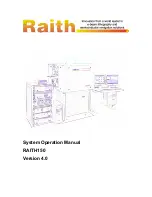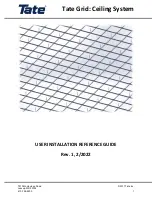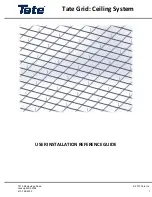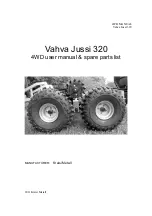
Operation
6
XPR300
Instruction Manual
809480
217
Processes for special applications
Underwater cutting
Underwater cutting can suppress the noise, smoke, and glare that plasma cutting produces.
Underwater cutting also decreases the heat-affected zone on the workpiece. On mild steel, it also
decreases cutting speeds and produces a rougher cut edge with increased dross.
You can expect the noise levels to average less than 70 decibels for many
processes during underwater cutting of metals that are up to 75 mm
(3 inches) below the water surface.
Make sure to satisfy the following conditions before you do underwater cutting:
Do
not
cut under water with fuel gases that contain hydrogen. It can cause an explosion.
Do
not
cut aluminum alloys under water or on a water table, unless you have installed the
correct safety equipment from your table manufacturer or cutting machine supplier.
Consult with your cutting machine supplier, the table manufacturer, and other experts prior
to cutting aluminum to implement a risk assessment and mitigation plan that eliminates the
risk of detonation by preventing hydrogen accumulation.
Do
not
cut a workpiece that is more than 75 mm (3 inches) below the surface of the water.
It can negatively affect cutting system performance.
Do
not
use True Hole
®
processes underwater. True Hole processes are not compatible with
underwater cutting.
True Hole cutting on a water table is possible only if the surface of the
water is lowered to at least 25 mm (1 inch)
below the bottom surface
of
the workpiece. For information about True Hole processes, contact your
cutting machine supplier or regional Hypertherm Technical Service team.
Make sure that the torch is perpendicular (at a 90° angle) to the workpiece.
WARNING
Underwater cutting with fuel gases or aluminum can create an explosion
hazard.
•
Do NOT cut under water with fuel gases that contain hydrog
en.
•
Do NOT cut aluminum alloys under water or on a water table, unless you
can prevent the accumulation of hydrogen gas.
Doing so can result in an explosion during cutting system operation.
Summary of Contents for XPR300
Page 1: ...XPR300 Plasma Instruction Manual 809480 Revision 2 English ...
Page 18: ...Contents 18 809480 Instruction Manual XPR300 ...
Page 34: ...Specifications 1 34 809480 Instruction Manual XPR300 ...
Page 66: ...Qualifications and Requirements 2 66 809480 Instruction Manual XPR300 ...
Page 188: ...Connect for Communication 4 188 809480 Instruction Manual XPR300 ...
Page 192: ...Coolant Installation 5 192 809480 Instruction Manual XPR300 ...
Page 230: ...Operation 6 230 809480 Instruction Manual XPR300 ...
Page 337: ...Parts List 9 XPR300 Instruction Manual 809480 337 ...
Page 343: ...Parts List 9 XPR300 Instruction Manual 809480 343 ...
Page 380: ...Wiring Diagrams 10 380 809480 Instruction Manual XPR300 ...
Page 381: ...381 Overview Sheet 1 of 22 013403 013403 ...
Page 382: ...382 Plasma power supply 1 Sheet 2 of 22 013403 ...
Page 383: ...383 Plasma power supply 2 Sheet 3 of 22 013403 ...
Page 384: ...384 Plasma power supply 3 Sheet 4 of 22 013403 ...
Page 385: ...385 Plasma power supply 4 Sheet 5 of 22 013403 ...
Page 386: ...386 Plasma power supply 5 Sheet 6 of 22 013403 ...
Page 387: ...387 Plasma power supply 6 Sheet 7 of 22 013403 ...
Page 388: ...388 Plasma power supply 7 Sheet 8 of 22 013403 ...
Page 389: ...389 Gas connect console 1 Sheet 9 of 22 013403 ...
Page 390: ...390 Gas connect console 2 Sheet 10 of 22 013403 ...
Page 391: ...391 Torch connect console Sheet 11 of 22 013403 ...
Page 392: ...392 Coolant system Sheet 12 of 22 013403 ...
Page 393: ...393 Gas system 1 Sheet 13 of 22 013403 ...
Page 394: ...394 Gas system 2 Sheet 14 of 22 013403 ...
Page 395: ...395 Gas system 3 Sheet 15 of 22 013403 ...
Page 402: ...402 Wireless subsystem block diagram Sheet 22 of 22 013403 ...
















































